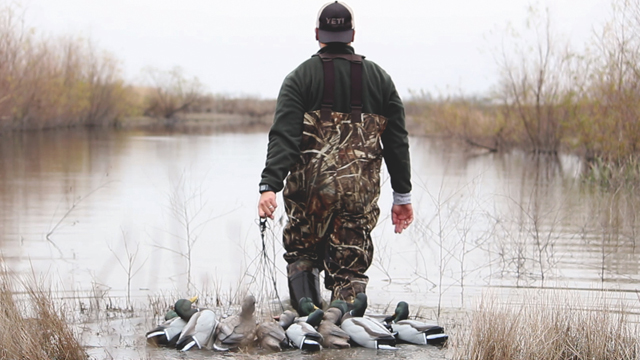DUCK DECOY RIGGING – TEXAS STYLE
By: David Frisbie
- Ease of setting/picking up spread
- Tangle free line
- Easy to mix & match (especially at 3am in the dark)
- Easily stored away
- Simple and cheap to rig up
The only drawback in my opinion is that it seems to chip off the paint a little quicker than a traditional decoy bag. But the convenience and speed outweighs a little decoy paint when you’re cold, wet, and in the dark.
So here’s how to do the Texas Rig for a half dozen dekes.
Supplies:
• 400# monofilament line (24 feet)
• 6- 4oz Mushroom weights (egg weights work too)
• 12 Aluminum crimp sleeves
• Crimping pliers
• Sharp knife
1) First, cut your line into sections. Mine are any where from 32 inches to 48 inches. Most the water I hunt is not more then 2 feet deep if that so I don’t typically need anymore than that. Use your judgement.
2) Second, run the line through the weight, make a loop and with a crimp sleeve. Trim the extra end of the line off COMPLETELY. If you don’t these tags can catch on the other decoy lines and be a pain in the butt.
3) Next on the other end of the line run it through the hole in the keel of your decoy. If there isn’t one use a 1/4 inch drill bit and make one. After the line is run put a crimp sleeve on the end of the line and form an overhand knot making about a 2-3″ wide loop. Then you continue to pass the open end of the line thru the loop 2-3 more times until you make it back around to the crimp sleeve. The open end then goes into the crimp sleeve and is crimped shut. Again, take off any extra line to prevent getting hung up.
4) Then you clip all the loops together, I use carabiners. Usually buy a neon green or blaze orange one so they are easily found if dropped. They also clip on to the D rings on your waders. I typically put 1 dozen decoys per carabiner.

When hauling them in the field I usually tie an over hand knot in the middle of the line to keep them tight together. When storing them let them hang freely to prevent any kinks in the line.
I don’t know about anyone else but I need to keep my hands and mind busy during the off season. You know what they say about idle hands. Rigging up and repainting decoys is a great way to stay in tune with this sport I love so much. So this summer when I am laying on the beach, sand between my toes, cold drink in my hand, and that salty sea air hits my nose, I won’t be worried about the sunburn I’m certainly getting. I will be picturing a group of redheads dumping into my decoy spread!
Tight Lines and Big Tines!
David Frisbie
Need to get on the water quicker? Try the Tanglefree EZ Rig system. The swivel clasp is a really nice touch!


